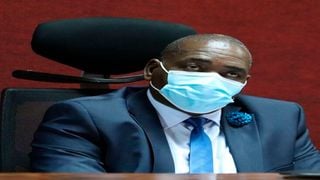
Justice Anthony Mrima.
| Dennis Onsongo | Nation Media GroupNews
Premium
Judge Anthony Mrima: I have received threats
High Court Judge Anthony Mrima has disclosed that he received threats because of unfavorable orders against State officers.
While sentencing Director of Criminal Investigations George Kinoti for contempt of court, he said he had been warned that he would be dealt with.
The judge said he had recently handled a case involving senior State officers and one of them sent an emissary to him to communicate the warning.
Director of Criminal Investigations George Kinoti.
“I was surprised to be approached by an emissary sent by one of the said State officers. The emissary had one clear message, that I should stop being personal and cease to issue what was described as unfavourable orders,” the judge said.
“The message did not end there. I was further informed that if I do not heed the warning, I will be dealt with firmly and finally using many other processes at their disposal.”
Among the recent adverse orders he has issued against President Uhuru Kenyatta’s administration is nullifying the position of Chief Administrative Secretary, a ruling that affected more than 20 government officers, mostly 2017 poll losers.
In another case, he barred Nairobi Metropolitan Services (NMS) Director-General Mohamed Badi from attending any Cabinet and Cabinet committee meetings or discharging any Cabinet functions.
He also reversed President Kenyatta's decision to transfer the Kenya Meat Commission to the Ministry of Defence.
The judge also quashed directives issued by the National Security Advisory Committee banning public gatherings and political rallies in order to combat the spread of Covid-19.
He also recently ordered the police to produce in court lawyer Hassan Nandwa, who had gone missing with his client terrorism ex-convict Elgiva Bwire.
The judge, however, said he was not new to threats and actual acts of violence. He recalled that in the last election several emissaries were sent to him with instructions on how to determine an election petition he was handling.
He declined and made his position clear in one of the court hearings.
“My position immediately elicited a vicious reaction. My house was burgled into. It was ransacked. Things were thrown all over. Save for a safe which was carried away, everything was left in the house,” the judge said.
The safe was abandoned a few kilometres from his house, but “in utter shock and surprise, everything in the safe was intact except the broken lock”.
“I have shared the foregoing not out of fear, but to affirm my position that I will endeavour to uphold the oath of office,” he said.
“I have never imagined myself being personal to any of the parties in a matter. I urge the litigants who appear before me to be assured that their matters will be decided on the strength of the evidence and the law.”
He disclosed these experiences while ruling on a contempt case filed by businessman Jimmy Wanjigi over the DCI’s failure to release seven firearms and ammunition belonging to the presidential aspirant.
In the ruling, the judge ordered Mr Kinoti to surrender himself to the officer in charge at the Kamiti prison within seven days to serve his four-month sentence.
“In the event that Mr Kinoti fails to (present) himself as ordered, a warrant of arrest will be issued against him. The warrant shall be forthwith executed by the Inspector-General of Police,” Justice Mrima said.
“In the further event that the Inspector-General fails to execute the warrant, the same shall remain valid and be executed at any time including when Mr Kinoti leaves the office of DCI.”






